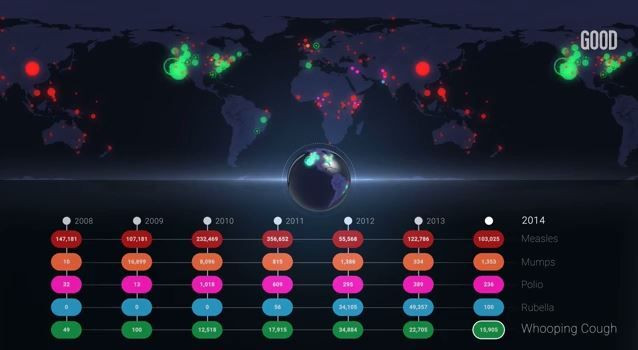Anti-Vaxxers Are Too Stubborn To Convert; Preventable Diseases Spread Globally As A Result

Vaccines stop us from contracting measles, mumps, and the flu, among other preventable diseases, but inexorable myths stand in the way of protecting everyone. Researchers from Dartmouth College dissected the dangers of arguing with an anti-vaccination stance, and found there’s a delicate way of breaking the truth to them. The study published in the journal Vaccine, found that by patiently presenting accurate information to anti-vaxxers, they received a much higher success rate than simply arguing.
When researchers provided straight-forward, fact-filled material that concluded the flu vaccine does not give you the flu, those with "high levels of concern about side effects were less likely to report that they would be immunized after seeing this information," the authors wrote. Success is in the hard-to-argue facts supplied by research-intensive studies, and if you don’t believe them then it’s a bigger issue on mistrust in authority than it is in scientific evidence.
"These results suggest that correcting vaccine myths may not be an effective approach to promoting vaccination," the authors wrote. "If misperceptions are the expression of a more generalized antipathy toward vaccines, then addressing these myths piecemeal is unlikely to be effective. A more comprehensive strategy is likely to be required."
The researchers found that although the seasonal flu is responsible for thousands of deaths and billions of dollars in medical costs every single year, vaccination opponents won’t change their minds. Today, one in four parents believes vaccines have caused autism in children who were otherwise healthy. As a consequence, there has been a steady decline in the amount of children vaccinated. In the past 20 years, childhood vaccinations will have prevented 322 million illnesses and 732,000 deaths throughout their lifetime, according to the Centers for Disease Control and Prevention.
But it doesn’t matter what you say. The study’s coauthor, Brendan Nyhan, an assistant professor of government at Dartmouth, told The Washington Post when someone is as stalwart as many of the anti-vaxxers are, they will cling to myths like safety blankets, sucking on a thumb of lies, and crying to their like-minded friends. A closed mind is a dangerous one, and the spread of preventable diseases around the world. Seven years of outbreaks were captured between 2008 and 2014 on a data visualization that may drive the threat home to many who still don’t understand the severity. Between that time, the cases of vaccine preventable disease rose more than 6,000 percent in North America alone.
"Our explanation is that when you're challenged, you often try to defend the underlying belief or attitude that's come into question," Nyhan said. But people must accept the fact a vast majority of Americans choose to vaccinate, while a very small percentage choose not to vaccinate themselves or children, Nyhan said. "We have to be realistic. It doesn't mean we should give up hope."
Source: Nyhan B, Reifler J. Does correcting myths about the flu vaccine work? An experimental evaluation of the effects of corrective information. Vaccine. 2014.



























